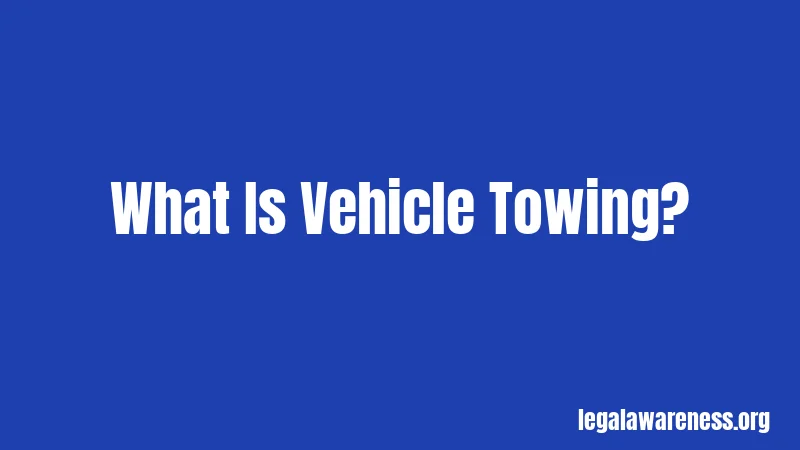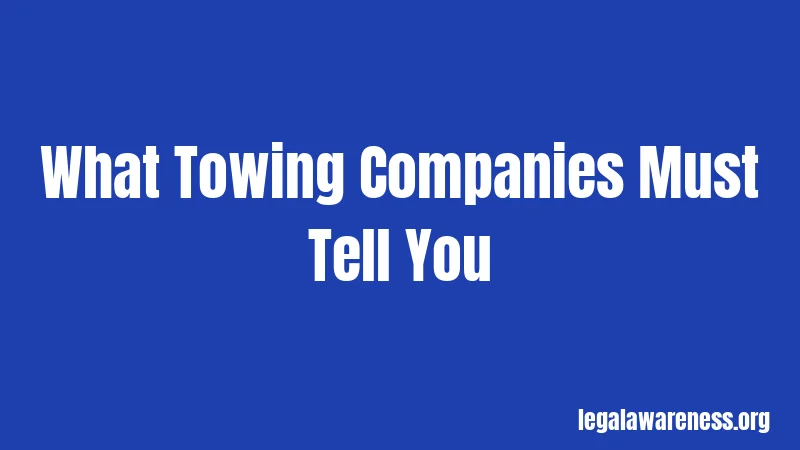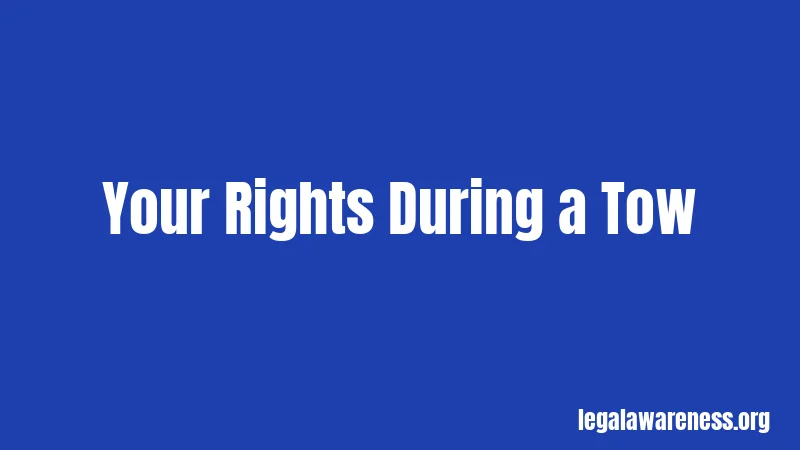Washington Towing Laws (2026): What Actually Happens to Your Car
Most people never think about towing laws until it’s too late. Then suddenly, your car is gone. You’re standing there confused, wondering what just happened and how much this is going to cost you.
Here’s the thing: Washington has pretty specific rules about when tow trucks can legally take your vehicle. And honestly, understanding these laws could save you hundreds of dollars. Let’s break down exactly what you need to know.
What Is Vehicle Towing?

Towing is when a truck removes your car from where it’s parked or sitting. Sounds simple, right? But there’s a lot more going on behind the scenes.
A tow operator can take your vehicle in several situations. Your car might be blocking traffic. It might be parked illegally. Or maybe you left it abandoned somewhere. But here’s the important part: not every reason is legal, and not every tow truck has the right to grab your car.
When Can Your Car Actually Be Towed in Washington?
Okay, pay attention here. These are the main situations where a tow is actually legal.
Private Property Towing
You’re at a store. The parking lot sign says “Unauthorized vehicles will be towed.” Your car gets towed. Is this legal? Honestly, yes. Property owners can have cars towed from their own land.
But wait, there are rules even for this. The property owner or their authorized agent must request the tow. They can’t just do it randomly. There also has to be a visible sign posted. The sign needs to show the towing company’s phone number and how much it costs.
Not sure if this applies to you? Check those parking signs carefully. Most private parking lots have this information displayed. If they don’t, that’s a red flag that the tow might not be legal.
Police-Ordered Towing
This one’s straightforward. If a police officer orders your car towed, it’s legal. This usually happens when you’re parked where you absolutely shouldn’t be. Think no-parking zones, fire lanes, or blocking someone’s driveway.
Police can also order a tow if your car is abandoned. Washington defines abandoned as left in the same spot for more than 72 hours. Pretty clear rule, right?
Hazard or Traffic Obstruction
Your car is blocking traffic. Or it’s parked in a way that creates a safety problem. A tow operator can remove it. This protects other drivers and pedestrians.
Basically, if your vehicle is in the way and creating a real problem, it can be towed. This doesn’t mean slightly blocking a curb. We’re talking actual hazards here.
What Towing Companies Must Tell You

Here’s where things get important. Stop, read this carefully.
Washington requires tow companies to give you specific information. They need to tell you:
Where your car is being taken. The towing company must provide the location of their storage yard. They can’t just drive your car somewhere secret.
How much this will cost. You deserve to know the price before your car is towed. The company needs to post their rates publicly. These rates need to follow state guidelines for what’s fair.
How to get your car back. They must tell you exactly what you need to do. Usually, you’ll need to pay the towing fee and any storage charges.
Here’s what most people don’t realize: the towing company must give you this information at the scene. Not later. Not in small print. Right there when they show up.
Storage Fees
Okay, this one’s probably the most expensive part. Once your car is at the yard, storage fees add up fast.
Washington limits how much a tow company can charge for storage. The exact amount depends on what type of vehicle you have. For a regular car, expect to pay a daily fee that follows state-set limits. For RVs or large trucks, the fee is different.
Let me give you the real story: storage fees get expensive quickly. If your car sits for a week, that’s seven days of charges piling up. A month? You’re looking at serious money. This is why getting your car back quickly matters.
Protected Vehicles and Special Rules
Not every vehicle can be towed the same way. Some cars and situations have extra protection.
Vehicles With Disabled Placards
Your car displays a disability parking permit. Does that stop a tow? Not completely, but it limits what can happen.
A vehicle with a valid disabled placard can be towed for breaking the law, just like any other car. However, the tow operator needs to document that the placard was displayed. They need to know what parking violation actually occurred.
This means you have better protection if you were legitimately parked in a disabled spot. If you were parked illegally somewhere else, the placard doesn’t help.
RVs and Recreational Vehicles
RVs follow different rules. For one thing, they can’t always be towed the same way as regular cars. The towing company needs special equipment for larger RVs.
Storage rules are also different. Your RV gets charged differently than a sedan. The daily storage fee might be higher. But the basic principle stays the same: they can’t charge outrageous amounts.
Abandoned Vehicles
Washington takes abandoned vehicles seriously. If your car hasn’t moved in 72 hours, it can be towed.
But here’s the twist: the city or police department usually tries to notify you first. They’ll put a notice on your car. That notice gives you a certain amount of time to move your vehicle before it gets towed.
That notice is your warning. If you see one, act immediately. Move the car or call the authorities with an explanation.
Your Rights During a Tow

Let’s talk about what you can do if a tow truck shows up for your car.
Can You Stop Them?
If the tow is happening legally, you can’t physically stop them. But you can ask questions. You can ask to see proof that they have the right to tow your vehicle.
A legitimate tow company will have documentation. They’ll have authorization from the property owner or police. They’ll be professional about it.
If they can’t explain why they’re towing your car, that’s suspicious. Write down their company name, the truck number, and the time. This information could help later.
Protecting Your Stuff Inside the Car
Here’s something important: anything inside your car is your responsibility. Tow companies aren’t responsible if items go missing.
Make sure your car is locked. Take valuables with you if possible. Don’t leave important documents or cash in your vehicle. This protects you in case something happens during or after the tow.
Getting Your Car Back
This part’s actually pretty straightforward. You go to the tow yard. You pay the fees. You get your car back.
But pay attention here: you need valid proof of ownership or authorization. Bring your driver’s license and car registration. If someone else owns the car, they’ll need to give permission for you to pick it up.
Most tow yards accept cash or cards. Some require one or the other. Call ahead to ask before you show up.
What If the Tow Was Illegal?
Wondering if you can fight back if your car was towed unfairly? You actually have options.
If a Private Property Tow Seems Wrong
Check that sign again. Was it posted? Did it have the required information? If the sign was missing or unclear, the tow might be illegal.
Contact the towing company first. Ask them to prove they had the right to tow. Request documentation from the property owner. Sometimes just asking makes them take a second look at what happened.
If a Police Tow Seems Wrong
This one requires different steps. You can file a complaint with the local police department. Explain why you think the tow was unjustified.
You might also contact a lawyer. Illegal towing is a real thing, and if your car was taken without proper reason, you could have a case. Most lawyers offer free consultations.
Getting Money Back
If you can prove the tow was illegal, you can sue for your towing and storage fees. You might also get compensation for the inconvenience and costs.
The process takes time and effort. But if the tow was clearly wrong, it’s worth pursuing. Document everything: photos, times, conversations, receipts.
How to Avoid Getting Towed
Here’s the good news: most tows are preventable.
Read the Parking Signs
This sounds obvious, but most people don’t do it. Look at every sign in the parking area. Check times and restrictions. If something seems unclear, don’t park there.
Honestly, this is the number one way to avoid a tow. Take 30 seconds to read the signs. It could save you $200 or more.
Don’t Leave Your Car Abandoned
If you’re leaving your car somewhere for more than a few days, move it. Or park it somewhere clearly legal. Don’t let it sit in one spot for weeks.
If you know you’re leaving town, ask a friend to move your car occasionally. Or use a storage facility designed for long-term parking.
Respect Private Property Rules
If you’re on someone else’s property, follow their parking rules. Period. They have the legal right to tow, and they’ll use it.
When in doubt, ask permission. Call the property owner or manager. Get clear approval before you park there long-term.
Keep Your Registration Current
A car with expired registration can be towed as abandoned. Even if you paid for the car, if you haven’t registered it, it’s at risk.
Renew your registration on time. Keep proof in your car. This one simple step prevents a lot of problems.
Recent Changes and Updates in Washington
Washington towing laws have gotten stricter about transparency. Stay with me here.
In recent years, the state has focused on making sure people know their rights. Tow companies must be clearer about costs. They need to provide information faster.
There’s also been more attention on predatory towing. Some companies were charging unfair fees or towing cars without proper authorization. New regulations have cracked down on this.
The key takeaway: Washington is protecting consumers more than before. But this also means tow companies follow stricter rules. Understanding these rules helps you protect yourself.
What Changed in 2024 and 2025
Storage fee caps were reviewed to stay fair with inflation. The state wants to make sure fees aren’t shocking surprises. Some areas updated their regulations to require faster notification to car owners.
If your car was towed recently, current rules might be different from when you last checked. It’s worth looking up the current information for your specific city or county.
Frequently Asked Questions
How much can a towing company charge in Washington? Towing fees follow state guidelines and vary by vehicle type. Standard passenger car towing ranges from around $100 to $200+, depending on distance. Storage fees are capped but vary by county. Always ask about the total cost before authorizing a tow.
What if I can’t afford to get my car back right away? Contact the tow yard immediately. Some will work with you on payment plans. Waiting makes things worse because storage fees keep adding up. Act fast to minimize the total cost.
Can a tow company sell my car if I don’t pick it up? Yes, eventually. Washington allows tow companies to sell abandoned vehicles after a certain period. Usually, they must make efforts to contact you first. Don’t wait too long or you could lose your car permanently.
Do I need permission to tow someone else’s car from my property? Yes, you do. You can’t just call a tow truck yourself. You need to follow proper procedures. Consult local police or the city about the right way to handle it.
What documents do I need to pick up my towed car? Bring your driver’s license and car registration or proof of ownership. If you’re picking it up for someone else, you’ll need their written authorization. Call the tow yard first to confirm what they require.
Final Thoughts
Okay, here’s what you actually need to remember: Washington towing laws are designed to protect both property owners and drivers. Tow companies have the right to remove illegally parked cars. But you have the right to know why and how much it costs.
The best defense is knowledge. Read parking signs. Don’t leave your car abandoned. Keep your registration current. These simple steps prevent most towing problems.
If your car does get towed, act fast. Call the tow yard immediately. Get it back before storage fees destroy your wallet. And if you believe the tow was illegal, document everything and talk to a lawyer.
Now you know the basics. Stay informed, stay safe, and when in doubt, look it up or ask a lawyer. Your car’s safety depends on it.
References
Washington State Legislature: RCW 46.55 (Vehicle Removal)
Washington State Department of Licensing: Towing & Impound Information
Washington Consumer Protection Act: Vehicle Towing Regulations
City of Seattle: Vehicle Towing and Impound Rules
Washington State Attorney General Consumer Protection Division
